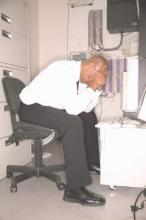LAS VEGAS – Federal officials have spent months listening to doctors’ complaints about their frustrating EHRs and are responding with a core group of changes to simplify and standardize health IT.
“We’ve made a great start, but we’re still at a stage where technology often hurts rather than helps physicians to provide better care,” Andy Slavitt, acting administrator of the Centers for Medicare & Medicaid Services, said March 1 at the annual meeting of the Health Information and Management Systems Society.
He provided some examples of complaints he hears from doctors: “Ordering aspirin takes eight clicks on the computer; to order full-strength aspirin, 16,” he said as the audience laughed.
And, “the systems don’t talk to each other. It’s actually the opposite. I can’t even access the hospital because of a firewall, and I can’t even get into the EMR at the hospital to look at patient records.”
And, “I can’t track my patients’ referrals,” or “I sent them to the hospital and I don’t know what happened.”
Mr. Slavitt said that he has 700 complaints from doctors just like those. “But the good news is that they’re not describing problems that we don’t know how to solve.”
And, he said, solving them is exactly what the CMS and a host of other agencies within the Health and Human Services department are trying to do with a raft of new proposed rules and announcements designed to more easily connect patients and providers with health care information necessary to provide better care.
Mr. Slavitt’s view of the EHR situation was echoed by Dr. Karen DeSalvo, national coordinator for Health Information Technology, who said that her husband is a practicing physician with real time frustrations.
“That’s my dinner conversation,” she said. “He’s a very clinically busy emergency medicine doc, and he wants the system to enable his workflow, and just like many physicians, it’s the same common refrain.”
Part of the solution is a proposed rule announced March 1 that would allow the Office of the National Coordinator for Heath Information Technology (ONC) to directly review certified health IT systems “and take action necessary including requiring the correction of nonconformities found in health IT … and suspending and terminating certifications.”
The proposed rule would:
• Enable ONC to directly review certified health IT products, including certified EHRs, and address circumstances such as potential risks to public health and safety. This would complement the existing responsibilities of ONC-Authorized Certification Bodies.
• Give ONC direct oversight of health IT testing bodies.
• Publish information on the performance of certified EHRs and other certified health IT products so that users can easily understand both the positive and negative aspects of each product.
Also on March 1, ONC announced $625,000 worth of challenge awards to encourage the development of mobile apps that patients and physicians can use to manage health information. The challenge will encourage the use of open, standardized application programming interfaces and one federal programming language standard (the Health Level 7 – Fast Healthcare Interoperability Resources or FHIR).
More expected rule making will come in several months to roll out expectations under MACRA, the Medicare Access & CHIP Reauthorization Act of 2015, including the Merit-Based Incentive Payment System (MIPS) and more alternative payment models such as accountable care organizations and bundled payment plans.
Under MIPS, Mr. Slavitt said, Congress is asking to measure quality, resource use, use of technology and practice improvement.
In addition, Mr. Slavitt said the CMS intends to roll out EHR requirements for long-term care facilities and behavioral health care providers. And, he said, “significant, significant effort and rules are underway” to improve quality and access for patients under the Medicaid program.
“I need physicians who are committed and who feel that part of their role is to take care of people who need care the most, who have lower socioeconomic status and who are more difficult to treat.”


